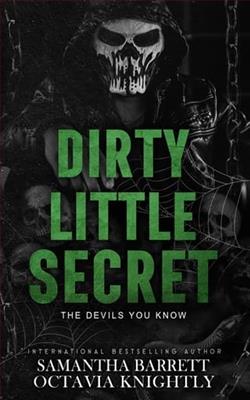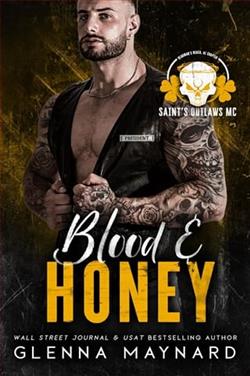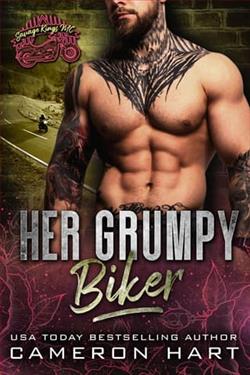Page 67 of The Cornish Princess
Any time a farmer came with a grievance, Cunedda listened mindfully, then invited the man to sup and drink whilst they ruminated over solutions.
Certainly, there was much about Cunedda that reminded her of her father, but though Cunedda was scarcely younger than her sire, his face did not show the same hard years, and his laugh lines were deeper than the lines in his brow.
In like form, his servants jested with their lord and lady, and her cousins told jokes as ribald as any man’s. Wine flowed. Small plates passed hands—not olives from An Ghréig, nor sardines from Hiberia, but simple pilchards, fished from nearby shoals, served withhevvacake and mead.
Borlewen was bolder than Jenefer and Briallen, and extraordinarily talented. One evening, she played the harp by the hearth, making up stories that put a blush in her father’s well-hewn cheeks. Yet another evening, she took a dagger from her belt—the one she’d been using to sup with—and splayed her hand on the supping table, stabbing quickly in succession between her fingers to illustrate her prowess with the blade. Everyone watched with halted breath.
The dagger itself was quite unusual. Poniards were normally meant to be used for slicing. Usually slender, with a triangular blade, this one was longer and double-edged, similar to a sword, and far more suitable for stabbing. More than the trick itself, impressive as it was, Gwendolyn was interested in the blade.
“Want to try?” her cousin asked with a wily grin, and Gwendolyn shook her head, crossing her arms.
“Indeed, I do not!”
“And you?” she inquired of Málik. “Art certain to be braver than a silly girl?”
Gwendolyn laughed at the barb, knowing her cousin meant no harm. To the contrary, there was a certain look in her eye that left Gwendolyn quite certain that Borlewen considered herself far superior to all men—Málik and her father included.
“Am I?” asked Málik with a half-smile. And then, after sharing a brief look with Borlewen, he shrugged and offered a hand.
Borlewen grinned victoriously.
Calmly, Málik spread his fingers, and once again, without waiting to bolster her courage, or taking time to assess the position of his hand, Borlewen stabbed quickly in succession, accurately missing flesh and bone and embedding the sharp blade deep into wood at the end, so it hummed for a moment as the grip shivered.
Gwendolyn lifted a brow, only now noticing the multitude of pock holes in the table, and she wondered how many fingers Borlewen had taken before perfecting her trick. Fortuitously, she still had all of her own.
“’Tis quite the talent,” offered Málik as he withdrew his hand and slid it back into his lap. And if he’d held his breath for a good end, it was not the least bit apparent.
Then again, Gwendolyn thought, without truly believing it, if he wasfae… perhaps he could regrow his fingers and toes, like Núada of the Silver Hand, who was said to have lost his arm, then his crown, and regained it all after growing back the arm in silver.
“May I see the blade?” Gwendolyn asked.
“Certainly,” said Borlewen, proffering the dagger, hilt first. She grinned. “’Tis long enough to slide betwixt ribs, and prick a heart,” she said, with one lifted brow. “My father had it made for me.”
The marking on the hilt was the ancient guardian of Dumnonia—her father’s standard, of course—and there was a small black pearl in the dragon’s eye. These were rare, and one legend claimed that black pearls were formed in a dragon’s head, and that one had to slay the dragon to claim his pearls. However, this was clearly not true, for there were no dragons anymore—if ever they had existed. And still, it was quite an extravagant gift. Even amidst their own Cornish oysters, a simple white pearl was rare as a ghost orchid.
Cunedda entered the room, laughing boisterously as he overheard his daughter speak about the dagger. “And still she never took my hint. Notice the tongue?”
Gwendolyn looked again and found the barbed tongue missing—how clever!
“If he thought that alone would hush me, he must think again!”
Gwendolyn laughed, her brows lifting, and everyone joined her, Borlewen’s laughter ringing louder than all. Handing back the blade, Gwendolyn felt wistful for a family like this—a father that would laugh with her, far more than anything else. Gwendolyn had more than enough gifts of silver and gold. And they were all the same blood, but… Gwendolyn longed for such ease.
Alas, this was bound to never change. She was raised differently, and though some would say better, Gwendolyn didn’t think so. She had more, this much was true, but more was not better—take her cousins, for example. They lived as they pleased, plainspoken and free. And even Ia, with all her grief, had clearly experienced a love that was sweet and true, for no woman wept so bitterly over the loss of a man if she could despise him, nor wish him dead.
That night, nestled in bed with Jenefer, Gwendolyn and her cousins talked about the evening, laughing about the way her uncle seemed to believe no one could see him when he slid his hand beneath the table into the crook of his wife’s thighs.
“He doesn’t care,” said Briallen.
“Oh, he does,” argued Jenefer. “Rather, he believes himself too cunning—like Kitto, every time he nugs you behind the ale casks, Borlewen.”
Borlewen laughed. She drew up the woolen blanket to her lips to hide a smile, but her blue eyes twinkled fiercely.
“You must like it,” offered Briallen.
“Indeed, she does,” said Jenefer. To which she added. “Alas, you’d best take care, baby sister, lest you end with a child in your belly and no torc to declare you.”
“Blood and bones!” exclaimed Borlewen. “Better this than waiting so long my womb withers and dies—like Lowenna! At least this way I will have a child of my own to raise and plow my fields.”















